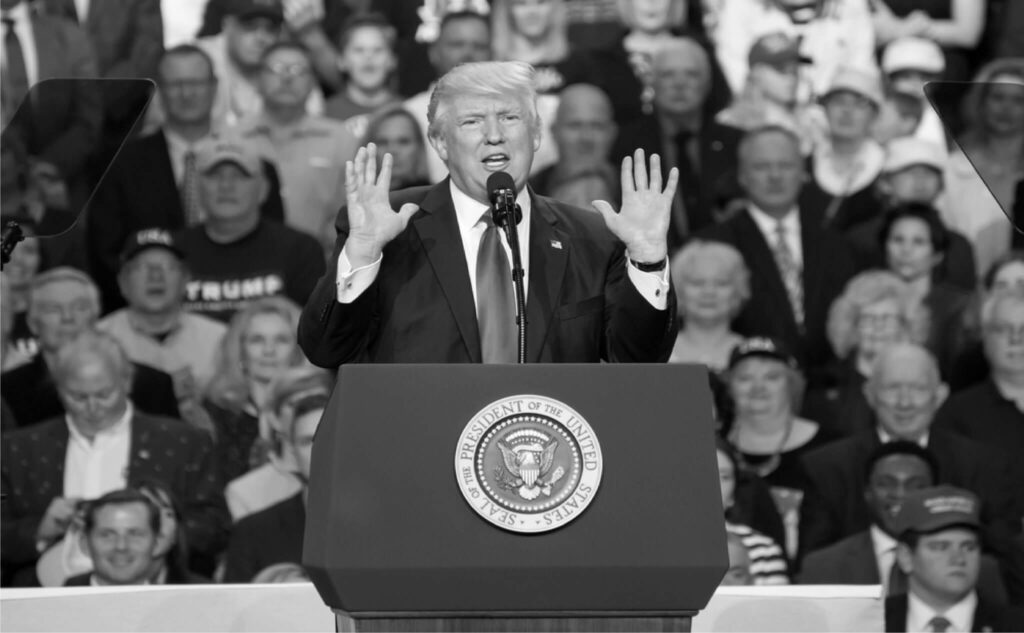“Accountability is as important as the concept of leadership. Those who are granted power must be held accountable.”
These observations came from John W. Gardner – former Secretary of Health, Education and Welfare under President Lyndon Johnson – in his book, Excellence, published in 1961.
These words are as relevant today as they were over fifty years ago. The reason is that when all is said and done, leaders will be judged on what they do, not just what they say they’ll do. Truly accountable leaders ensure they step up to deliver on their obligations to those they lead.
If you have followed my work over the last few years, you’ll know I’ve been writing and speaking a lot about leadership accountability. More specifically, the leadership contract that all of us who are in leadership roles must sign.
So imagine my reaction when the world’s most powerful leader created his own leadership contract with the American people. I’m speaking of U.S. President Donald Trump.
In it, he proclaimed his 100-day action plan and pledge to “Make America Great Again” by focusing on restoring honesty and accountability, and bringing change to Washington. He then spelled out the immediate priorities that he would focus on.
When the contract first came out, I was impressed that he would take such an action. In the end, it’s exactly what I would advise any leader to do. So kudos to President Trump. But then I thought, is this real or a political ploy?
We’ll have the answer based on how he leads. However, one thing must be made clear – creating a contract is one thing, but living up to its terms is something entirely different.
And so as he approached the end of his first 100 days, many began to evaluate his presidency. To say that he’s been the subject of scrutiny would be an understatement; he’s been the most talked about leader on the planet. His every word and action have been analyzed, debated and evaluated. In fact, as I’ve travelled the world speaking to leaders about leadership accountability, his name has come up in every single presentation.
So how did the president do? First, let’s take a look at how Trump assessed his own performance.
When asked about the first 100 days, Trump actually made a startling admission that he has found the job of being president “much harder” than his previous job. Imagine that – he thought running a large country would be easier than running a large company.
To be honest, I’m not sure what to make of that statement. Clearly, he underestimated what it was going to take to lead the world’s most powerful country. Many leaders fall prey to this same mistake. They underestimate the work and expectations of their role. But it’s odd that Trump could not have deduced how much larger and more complex his job would become as president.
Beyond that admission, Trump thinks he’s done a pretty good job. In fact, the White House issued a very flattering scorecard on April 27th that stated Trump had a lot of success in his first 100 days “reforming the Government to serve the American people.”
Trump did get stuff done like introducing new lobbying standards for political appointees, nominating Neil Gorsuch to the U.S. Supreme Court, and expanding mental health services to military veterans. Other things – like building a wall on the U.S./Mexico border, the ban on immigrants and visitors from some Muslim-majority countries, and the reform of Obamacare – he tried to get done, but he hasn’t delivered yet.
Much of what the White House listed as accomplishments were little more than the launch of initiatives to eliminate waste, reduce regulation, and create new federal offices that have yet to produce anything meaningful. These initiatives will require more time to take hold.
Outside the White House and the Oval Office, the reviews of Trump’s first 100 days were not quite as positive. A Quartz scorecard concluded that of the 28 items included in his Contract with the American people, 18 were either total failures or had not even been attempted. Only five measures, all the result of executive orders, had been fully completed.
It’s hard to ignore the fact that Trump is largely getting roasted because his 100-day promises were so bold and ambitious. It is an important lesson for all leaders: be very careful not to create a contract that you can’t live up to.
I was very deliberate in using the term in my book, The Leadership Contract, because I wanted the leaders reading it to realize that it is not enough just to promise to be better. You have to be willing to make your pledges – to your peers, your employees, your customers and investors – and show that you are committed to following through on the terms.
I thought it would be interesting to assess Trump’s 100-day performance against the four terms I outline in The Leadership Contract. The results were, I believe, quite interesting. Now it’s important to state that I am a Canadian. I really don’t have a political stake in this analysis. I’m a leadership adviser and I’m always interested in learning from other leaders what they do well and where they can be stronger so I can bring those insights to my clients and use them personally as well. So here we go.
Leadership is a decision. Make it. Trump most definitely made the decision to lead. He did not enter the Republican primaries last year with any sense he would be satisfied to fail. But there are certainly signs that he thought leading a country would be similar to leading a company. And his current job is really more complex and demanding than his previous job. He’ll need to regularly come back to his decision, as I suspect more challenges will confront him over the coming years.
Leadership is an obligation. Step up. His promise to “Make America Great Again” is a bold and compelling obligation. However, his many missteps have only succeeded in undermining what he was trying to achieve. Part of being a leader is acting like one. You have to rise above the day-to-day noise and distractions. I believe this is an area he will need to continue to pay attention to. In the end, he’ll be judged on one simple metric: did he leave the country better than how he found it? He also runs the risk of his bold pledge being judged as merely a political ploy – a form of fake accountability.
Leadership is Hard. Get tough. Trump told voters that if he got elected, he would put 100 percent of his time into running the company. He’s clearly shown a commitment to tackling thorny issues that other politicians would avoid. However, as I’ve written in my book, sometimes leaders confuse getting tough with being rough. And from a distance, that’s what it feels is happening here. He can come off as a bully. Let’s face it, that’s not real toughness.
Leadership is a community. Connect. The final term is the one that I believe needs the most attention. Trump and his team have been very adversarial, immersed in what appears to be an “us versus them” battle with anyone and everyone. He doesn’t express a lot of confidence in the other politicians he is working with. And he has had many awkward exchanges with foreign leaders and diplomats. For Trump to truly succeed as a leader, he will have to learn to build more bridges than he knocks down.
In his first 100 days in office, Trump does not seem to have met the terms of The Leadership Contract. Though his intention was to start strong and send a message of personal accountability, now it should be noted that the 100-day measure of accomplishment that politicians employ is rather arbitrary. In fact, a little over three months isn’t enough time to accomplish big things.
The good news for Trump is that he has 1,360 more days to get it right. I hope he uses this period to subject himself to a good old-fashioned gut check: recognize what he’s done well, and accept the brutal truth that he hasn’t yet lived up to the pledges he made to the people he leads.
As John W. Gardner stated, accountability and great leadership are deeply connected.
This week’s gut check asks: are you living up to the terms of your leadership contract?
We have many resources to help you become the most accountable leader you be, develop accountable leaders on your team, and scale leadership accountability across your organization.
Signup for our monthly newsletter with the latest Gut Check for Leaders, Lead the Future Podcast, and other important leadership accountability news.
Also, you can RSVP for our upcoming webinar, join our online community of accountable leaders, or buy Dr. Molinaro’s, latest book, Accountable Leaders, on Amazon.





